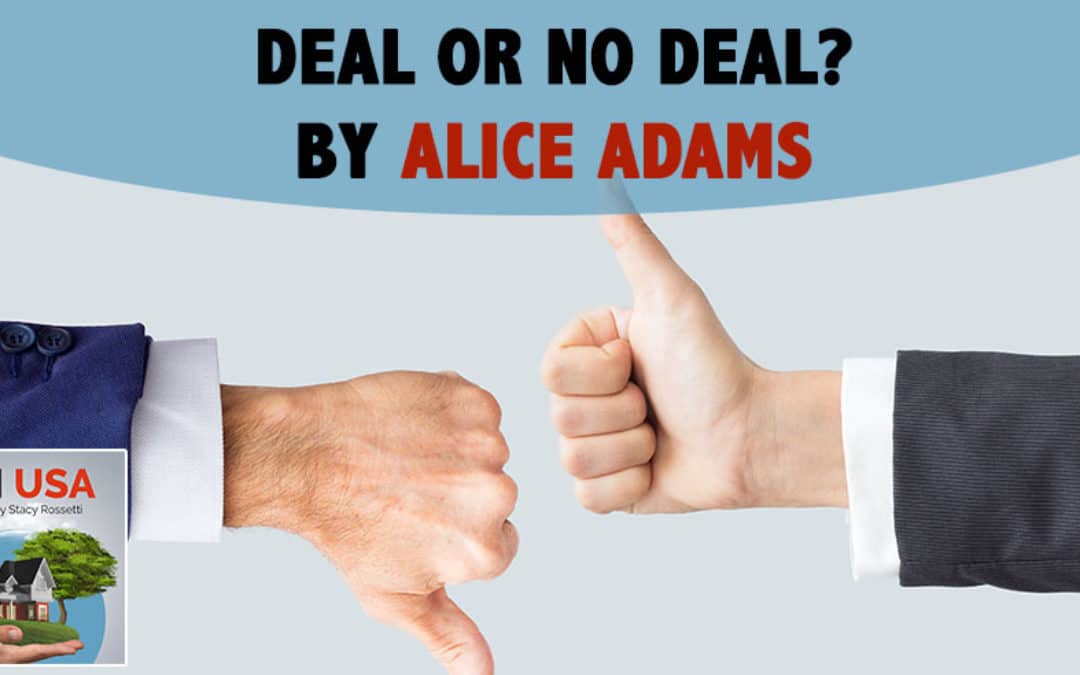
If you’re new to real estate, finding the right deals can be difficult. Especially if you have little experience and a small team, it’s hard to look professional. Join Stacy Rossetti as she talks to Alice Adams about how to analyze your real estate deals. Alice is a successful real estate investor, educator, and licensed real estate agent in Tempe, Arizona. She helps new investors break down real estate education into actionable steps.
Learn the following in today’s episode:
- Determining the value of your real estate investment
- Elements of real estate investment analysis
- Assessing property income
- Common real estate performance measurements
—
Watch the episode here
Listen to the podcast here
Deal Or No Deal? By Alice Adams
Thank you very much for coming up, Alice. How have you been?
I’m good. I’ve been busy. The market’s shifting a little bit with supply and demand. I’m handling all that, but it’s exciting, and I still think it’s good for investors. My belief is that change creates opportunities. We are coming into some change, and that’s one way that we have to learn to change with the market and make it work.
Let’s talk about investing. If you know what you are doing, you can make money in the upturn or downturn. You got to learn how to roll the dice and go with it.
The downturn last time was good for us. I came into real estate about 2005, so the market was pretty busy. There were lots of agents, flippers, and investors. When the market shifted downward, a lot of people left the industry. If you add your systems down and your ways to do business, our business went up a little bit. We are not afraid. We are preparing.
Alice teaches on Saturday. She does deal or no deal. She said she was good. Bring your deals, and she can run a deal analysis for you. You can talk about that, and then you can go into your presentation.
If you’ve got deals that you want a second opinion on, or maybe you are negotiating with the seller and want someone to double-check your numbers and double-check what you are seeing, that’s one of my favorite things to do. I have a lot of experience doing that. All over the country, I have worked for an educational program for a while before coming on with REI USA. We had new investors in every state in about every city.
I love to help you. I’d love to take a look at it. It’s the first Saturday of every month, at 12:00 Eastern 9:00 Arizona time. Let’s hop into this. I pride myself because I have worked with so many brand new investors, people who are shifting out of maybe the job they have had for years and wanting to get into real estate investing.
They are making a shift and may not be very experienced. I have tried hard to make sure that I am talking in actionable steps and giving you something you can work on rather than talking at a level that might seem too intimidating or you don’t quite understand where to go with the information you’ve received.

Real Estate Deals: Make sure you get the deal by following this format: Start by introducing who you are as a company. Then you want to introduce your whole team. Then put your mentors, advisors, and title agent.
I know there are a lot of different people and a lot of different levels. If you are new, please don’t compare yourself even to someone that’s been in the business for a year, much less 2, 5, or 10 years because you can grow quickly. I’m going to try to get this down to a basic level where you have some action steps that you can take when we are done talking.
Let’s talk about making sure you get the deal. In this instance, we are talking about making sure your deal gets funded with private money lenders, especially for new investors. What I would recommend is following this little format. If you’ve got no brochures, info, or nothing that you’ve been handing out to potential private money lenders, this will give you a basic way to start that.
You can add to it, but I tried to keep it simple, so it wasn’t overwhelming. In the simplified version, you could hand it out to a lot of people, maybe your CPA, people you’ve come into contact with, in the community, church, or anyone. You never know where that next lead is going to come from. Some of ours have even been retired investors that are done with managing the actual fix and flips. They want to be on the passive income side. They have got some understanding of how it works. They don’t want to have to put in the work.
I even had one of our lenders at the bank say, “I know the bank has a credit line for you of $500,000. I also like to get in and do some of these deals with you.” That shocked me because we already had money through his bank. You never know where it will come to but let’s start here. If I was starting brand new and had no experience, no deals under my belt, and I still wanted something to hand out, something tangible for people to look at and get their minds thinking and open to the possibilities, I would start with who we are and give a little synopsis of your company.
For us, we are in the Birmingham, Alabama market, flipping houses. We do wholesale here in Arizona. I am a licensed agent here in Arizona, but a lot of our flips are in Birmingham. It’s also a market that the rentals make a little more sense. It’s introducing our company, saying we specialize in buying distressed assets and outdated properties below market value.
That seems something everybody should know, but we know it because we are in real estate people that aren’t real estate minded and haven’t had experience wholesaling or flipping houses don’t even necessarily realize that. We then redevelop them or fix them up and resell them to home buyers and landlords. This is my favorite part coming up next. You are going to want to put your whole team here with a short bio for each person or company.
You might be thinking it’s me, and I don’t have any real estate experience. This section’s not going to look very good. I’m going to help you out here. You are going to put yourself if you’ve got any education, military background, community service, or anything that’s going to show you what a good light. You can put that for yourself.
If you’ve got a partner, spouse, or somebody else with you, put their picture and info. People want to see who they are doing business with. It helps them to connect to you. Next, I would go and talk to your mentors or advisors and see if you can put them on there, “My advisor Alice Adams has been in the business since 2005. Here’s what she does.” Maybe you want to put REI USA, “I am part of this national training REI USA,” and put a blurb on that. Maybe get the logo.
[bctt tweet=”When making a deal, help private lenders understand what your competitive advantages are.” via=”no”]
I also like to put my home inspectors. I have two that we typically use. Those are the people making sure that the investment is solid, that we are not going to get in there and find out there’s an issue that we weren’t expecting. My home inspector, photo, company name, and name are also there. I let them know or ask them, “Can I put their info here in case they were to get a call for somebody who’s doing some due diligence so they would know what to say and be expecting that?”
I also like to put my title agents here. It’s usually our closing agents, their info, and what they do. Make sure the title is clear and that we don’t end up with an unwanted lane or something we weren’t expecting there. You could make your team look much larger than you, and you have all these resources, especially if you are a part of REI USA.
There are enough teachers with experience in every facet of real estate that you’ve got a pretty solid team behind you. No matter what you might come up against, somebody who’s going to be able to help you take that next step or fix it. You’ll spread that out with photos and info, and then you are going to talk a little bit about the competitive advantage that your company has. You are helping these private lenders understand what we are doing when we look for a potential deal. This explains that we are a unique alternative for home sellers that bypasses working with a realtor, putting it on the MLS, and waiting for somebody’s loan to be approved so they can close.
This explains that we structure purchases by utilizing the private money investors like yourself, which allows us to make an all-cash offer and close quickly in 10 to 14 days. This gives our company the advantage of being able to move quickly when the bill requires that. You are opening them up to the idea and explaining why private money benefits your company and why you would be asking them to put private money because their question might be if you are that good, go to the bank and get a loan.
That’s helping answer that question to them that the banks aren’t quite as fast as we want them to be sometimes. Down at the bottom or somewhere on your page, you want to make sure that all of your contact information is clear. Your company name, mailing address, email, and phone number, that type of thing.
Once you’ve got their mind open to it, they are probably thinking, “What’s the worst-case scenario? How do I protect myself? What if you run off with my money?” We want to touch on that a little bit and say, “We protect our lenders, and here’s how we do that.” It’s telling them a little bit about the process we use to evaluate properties and that we only make sound and solid investment decisions.
It briefly goes over the documents that are used to secure your lenders’ investment. It mentions a promissory note, and there’s the definition. You’ve got a deed of trust or mortgage depending on if you are in a deed of trust state or mortgage state. That is showing that the document is recorded in the county and will show their lien on the property, ensuring that they get paid off when you sell the property.
Make sure that’s recorded. I know a friend that got private money. They forgot to record that, and the person they lent to got paid and decided that they weren’t going to pay them back. We want to make sure all of the systems at the title are recorded to secure their financing position. Lastly, you are going to note the hazard insurance policy, which is your insurance if something were to happen to the property, fire damage, or things that do happen. I have enough investor friends who know that things like that can happen, and we want to have that in place and make sure it doesn’t lapse to protect our lenders.

Real Estate Deals: You don’t need an appraisal when determining if a property is a worthwhile investment. As long as the comparables are very solid, you don’t typically pay for an appraisal just to pay for one.
Another one I did not mention here but have used is called a performance deed, but technically it’s a pre-signed deed in lieu that says, “If we don’t have this closed out by twelve months from now, and we are not making you payments and things aren’t going right, we will give the property back to you without making you even have to go through the foreclosure process, which can be expensive and time-consuming.”
We have signed the performance fee, but the deed in lieu ahead of time says if those monthly payments are missed or whatever the stipulations are, the private money lender wants to feel protected from missed payments, or after twelve months, it’s not paid off. That property is dated back to the private lender.
Sometimes if that’s one of their questions, we can add that. I don’t typically put it on here because I don’t want them immediately going there and questioning that. It is one way to share it up and make them feel better about not having to go through any long process that they don’t necessarily understand if they need to get the property back.
I would go into some of the due diligence processes on how you determine if a property is a worthwhile investment. This is talking about looking at the comparable property analysis. Are you going to get an appraisal? Our private money lenders never had us do that as long as the comps were very solid. Honestly, we don’t typically pay for an appraisal just to pay for one.
We typically show a little demographics and economic study on the neighborhood and the ZIP code. You can have your realtor pool average days on the market for that ZIP code. I also like to put on there how many days on the market it took for those comparable sold to sell. That’s a lot stronger than those who received an offer within 10, 14, or 30 days rather than sitting on the market for 3 or 4 months.
Everybody’s properties are selling super quickly. As the market neutralizes, we will see longer days on the market, and those things will be important to your investor. We let them know that we give them notes on what items will be repaired or fixed up, such as heating and air, plumbing, electrical, or roofing. This is a basic introduction to private lending. I also include this page and that initial handout.
We are not necessarily giving them all the details on the house we want to buy if they haven’t even been introduced to private lending. The point of this little packet thing passed out ahead of time. It doesn’t have a specific property that you are looking to get funded. It’s to open their mind and let them think about it.
Most people are not ready to throw $50,000 at you because you need funding for a deal that closes Friday. They got to have some time to process it and figure out the questions they had. This is the initial handout that we give. This explains private lending and gives them an overview of the process of what it looks like.
[bctt tweet=”Without the help of systems, it’s easy to overlook some costs.” via=”no”]
It’s showing that the investment is secured by the property purchased, which is different than the stock market or Bitcoin because there’s a tangible asset there. It talks about the returns and how much more that is compared to if the money was sitting in the bank. It’s a basic process spelled out, so they understand that the private lender funds the deal, and they received the documents that we spoke about, the promissory note, and the deed of trust.
Those documents we close on the home. We renovate the home. The home is then sold. The lender receives the principal investment plus interest that was agreed upon, and then we repeat the process. We are going to go ahead and let them know we want to keep their money working and keep those returns coming to their pocket.
You can show a little brief investment deal scenario. If you have a deal and used private money, put that deal here, but I want to make it work if you haven’t done your first deal. If you haven’t, you are still going to show a little blurb here that shows how it looks and how much money they would be putting in their pocket. For this one, it shows the purchase price and repair costs. When you add those together, it’s about $163,000.
Of that $163,000, if you are paying a 10% return over 6 months, that’s going to put $8,150 in that private lender’s pocket, which is so much more than the bank. It’s not going into so many details that they are confused and have a million questions. We want them to get the brief synopsis and then invite them to come and talk to us more about their goals and the level of risk that they are willing to take.
You want to have the call to action. Let them know what steps to take next. Here it’s saying, “If we haven’t already had the chance to sit down, I would like to. I want to know what your goals are and how we can help you meet those goals. When we haven’t a current opportunity that meets your criteria, we can send that out to you.”
That looks a lot different than, “I need money, and I need it by Friday. Here’s my company. I’m trying to overload them.” We are starting with this. If it were made printed on nice paper and would have it bound, it would look professional rather than stapled together. There are lots of ways to put it together. Our very first one was a little shorter, and it was on a tri-fold.
I had to print them. Way back then, they mailed them to me, and they already had the fold. It was a tri-fold brochure that we handed out. You could do it that way. I’m sure you are creative, but you want to make it pretty and professional. You don’t throw up everything in real estate when you are trying to get them interested.
I also thought it noteworthy to mention your referral program that, “Maybe this is not for them right at this minute, but if you know anybody who might want to invest and get better returns, reach out to us.” That’s also giving you credibility psychologically to them, “If they are working off referrals, Alice must have other investors that are happy, or she wouldn’t have been getting referrals.”

Real Estate Deals: Once you have a deal to be funded, you need some of the specifics for the opportunity. You need the property information, the address, bedrooms, bathrooms, garage, and square feet photos.
I didn’t say that. It might be my very first deal, but that’s what they are thinking. I like how to get this started. If anyone else might be interested, reach out. We are going to hop in to what to do when you do have the deal you need to be funded. This one you can do now even if you don’t have a house. You can prepare this basic 2 or 3-page introduction to private lending and how that would work.
When you find a deal, we are going to have another packet that you can pass out to those people as well. Let’s jump into that and see what information we would want to include to make sure we get the deal funded. We already noted that it’s best to hand out your private money partnership packets way before you need the money.
Once you have a deal to be funded, you need some of the specifics for the opportunity, the property information, address, bedrooms, bathrooms, garage, square feet, and photos. I like to put photos on mine. You probably are not going to put all 50. You could put some, and then you’ll have a Dropbox link that you can share if they want to see more.
I like to put the comparables. Usually, a minimum of three. If I have 4 or 5 good ones, I will go ahead and put those there too. Show your sold properties, including the same basic information as well as the sold date, the days on market, and some photos of those properties. This is what this subject property will need to look like in order to bring the $300,000 that we are expecting it to bring when we are done with the renovation.
This house has new flooring and cabinets, and the bathrooms have been updated. It gives them an idea of where you are trying to bring that subject property and what level of rehab. Maybe it doesn’t need new cabinets, maybe all of the rehabs. This happened to me, and I was trying to budget $20,000 for a kitchen. That was a rather sizable kitchen. We wanted to put it on a solid surface and this, that, and the other.
I looked at all the comps, and none of them had new kitchens. All of them had been sanded down, cleaned up, painted, and then the old countertops pulled off in something new or put on, but they did not replace those cabinets in the comparables. All of a sudden, in my budget, I’m able to save $10,000 or $12,000 by not having to do that part of it.
I like to show the pictures of the comparables and say, “This is the level of rehab we want to bring this property to.” I like to show a detailed scope of work so they can see how that renovation money is going to be spent. I have always had access to Hammerpoint. It was through Realeflow at one point and through the DealAutomator.
You can buy it separately. What Hammerpoint does is allow you to calculate those repairs and make it very easy to read. It looks like an official contractor estimate. It has a lot of prefilled information on what things cost. I had to adjust it when I moved from Tennessee in 2016 to Phoenix. Things cost a little more here in Arizona. Some things were a little bit less, but I went in and adjusted some of the preset numbers, so I didn’t have to do it every time.
[bctt tweet=”If you don’t have much experience, add your title company, your realtor and your inspectors so that you can look more like a business.” via=”no”]
When the price of lumber went up, I had to go in and adjust that and double-check it because the prices were all willy-nilly all over the place. Hammerpoint allows you and asks you, “Does it need a roof?” “Yes.” “Is it a small patch or large patch replacement?” You check the boxes, and it ballparks those numbers with the repair costs out to the side. “Does it need flooring? How much square feet? This is the cost per square foot for LVP.” It puts that number up to the side windows. It goes through everything, even down to the dumpster cost, because if you are taking off rows or demoing houses, you probably need dumpsters. You probably need permits.
Some of the things that get left out when I use this Hammerpoint estimator is making sure none of that happens for the hard cost of the renovation. Without systems, it’s easy to forget or overlook. One time, I went to flip a house and forgot to figure in the new tramp, like the baseboards and things for the whole house.
That’s when I was keeping it by hand. From that point, I always, even if I think I have it all written out by hand and all taken care of, still put it in here to make sure I didn’t accidentally skip over something that we didn’t add in as a cost. That is called Hammerpoint quick repair estimator. You’ll like it if you check that out.
After you show them the actual hard cost of the rehab, there are still some soft costs. Who knows what soft costs are? We might call it different things. These are going to be the costs that aren’t the materials for the house. If I’m thinking it’s a 3 or 4-month renovation, I still want to put six months of soft cost there because there are things that get held up that you are not expecting.
It might be permits. You might not be able to get the appliances or windows in. You never know. I always try to use six months of soft costs, and those are things like property taxes, property insurance, and maintaining the landscaping while you are rehabbing the property. You might have to have someone come by a mow, remove snow, or whatever that is. There are other costs that are involved when you are buying a house other than the actual rehab cost for the house. You’ve got real estate closing costs both when you buy the property and sell it. Those closing costs are to the title company and include the owner’s title insurance.
It can be a few thousand dollars. If you don’t know, you can call your title company and ask how much your closing fees are on a $200,000 house and how much is title insurance. You don’t have to guess. Our title company here, I can put in the address online, and it auto-populates, so I don’t even have to call them anymore. They got smart.
You’ve got potentially real estate commissions when you resell it. Maybe you are lucky if you’ve got a real estate agent on your team, a spouse, or a partner. If you’ve got to pay real estate commissions to get it sold, you want to figure in that 4%, 5%, or 6%, whatever that’s going to be. If you are looking for more to add to your power team, a strong real estate agent, somebody that’s been in the business and has some experience, is another great person to add on to that.
It shows that somebody that has lots of experience is looking at your deals and can give that private money lender more security. I don’t think we’d put a realtor on there, but that’s when you could add. Then you are going to show also the cost what the private money person would make when you pay them back and show them that there’s still a projected profit for you once it’s all said and done.

Real Estate Deals: You can use Hammer Point to show a detailed scope of work so they can see how that renovation money is going to be spent. It can calculate those repairs and make it very easy to read.
I would show them the math. Here’s a little blurb on how they can benefit from private lending. It’s reinforcing that their investment is secure with a tangible physical asset, which is the house itself or the structure. It’s retouching on, “You are going to make 4 to 5 times if not more than what a bank CD would pay you.” It’s saying private lending money means you can relax while the money is truly in a safe place working for you.
You want to invite them to do business together because we already have a specific deal, “You are going to put funding for this deal will be finalized by 6/01/2022” This way, they know, “I have got to make a decision on this if I want to be a part of this. We would love to partner with you.” Give them your contact information and let them know if they have questions that need to be answered. Reach out. Let’s sit down. Let’s talk. Let’s see if we are a good fit to work together and your contact information again. That gets us on the short presentation and what you can add to it. Once you have a property, tell me what questions you have.
I went over a presentation I did. If they put something that you have together, like here was my presentation, and then also Mike also went through something, not like this, but almost like this that he used that he put together. You can go back to Mike McKenzie and watch his thing and then watch my presentation with my private lender, and then also this. All three of us be rocking and rolling. This takes you step by step. You should be even talking to the lenders about it.
I agree. It was a big struggle. When we started, I didn’t have experience very much. I don’t have a big team. I don’t even know what to put here. Once you build out your title company, your realtor, and your inspectors, it looked more like a business rather than saying, “I’m Alice, and I’m brand new.”
This makes you look super professional. You got your crap together. That’s important, especially when trying to get money from people. That’s good. We had one question about Birmingham. Do you work in Birmingham to get wholesalers? What are you doing in Birmingham?
Our last flip was in Birmingham. We went through a not-so-great contractor. It’s the first flip I have done from that far away. I flipped a couple of hours away, but I could still hop in the car and get there, but this one in Birmingham, and I’m in Phoenix, was a first for me. We went through a contractor that didn’t turn out so well. Luckily we are able to pull that one all back on track and get a great contractor in there to finish it up.
We bought that property off of the MLS. It was a back on market that had fallen through twice, and the agent was completely sick of the house. That one came from the MLS. We do wholesale in Birmingham, and we pick other whole sellers and their properties. We look at them and see what we can do. There are a lot of super old houses there.
I personally don’t love the houses that were built around the turn of the century. I try to find them that were built in the ’60s or newer. I put a lot of work into one in many months and more or less had pretty much a break-even scenario on 1900 for the house. It made me realize that I rather find one a little bit newer and not have to do everything in the rehab.
It’s a lesson learned. Those historic homes are a pain in the butt. I never did a historic one. I almost looked at a couple, and I was like, “I don’t think I can do it.” I commend you for going through all that. They are beautiful to live in. I appreciate you coming and hopping on. Tell everybody one more time when you meet.
We are on the first Saturday of every month. It is 9:00 AM Arizona time, 12:00 Eastern.
She’s the wake-up-and-have-a-cup-of-coffee girl. It is what she is. Get up, have a cup of coffee and talk about deal analysis and all kinds of good stuff like that.
I love to see them.
I appreciate it. Thank you so much for hanging out, Alice.
Important Links
About Alice Adams
 Alice Adams is a successful real estate investor, educator and licensed real estate agent in Tempe, Arizona.
Alice Adams is a successful real estate investor, educator and licensed real estate agent in Tempe, Arizona.
She started real estate as an investor-friendly agent in 2005. After working with investors she moved into wholesaling herself. In the process, she’s had her hands in all manner of real estate transactions including fix and flips, creative deals, and short sales. When the market tanked in 2008 she opened Foreclosure Care and negotiated short sale transactions for sellers and agents alike. In 2016, she started working for a nationally recognized education company as a Mentor Advisor. She has helped 100’s of new investors learn the ropes and make the next step towards financial freedom.
Her superpower is the ability to break down real estate education into actionable steps. Her favorite parts of real estate are the psychology behind talking with sellers, data analysis, contracts negotiation and when a client gets his or her first deal.
Currently, Alice lives in Tempe, Arizona with her chihuahua Fluffy. She invests locally as well as virtual markets in Alabama and Ohio.

